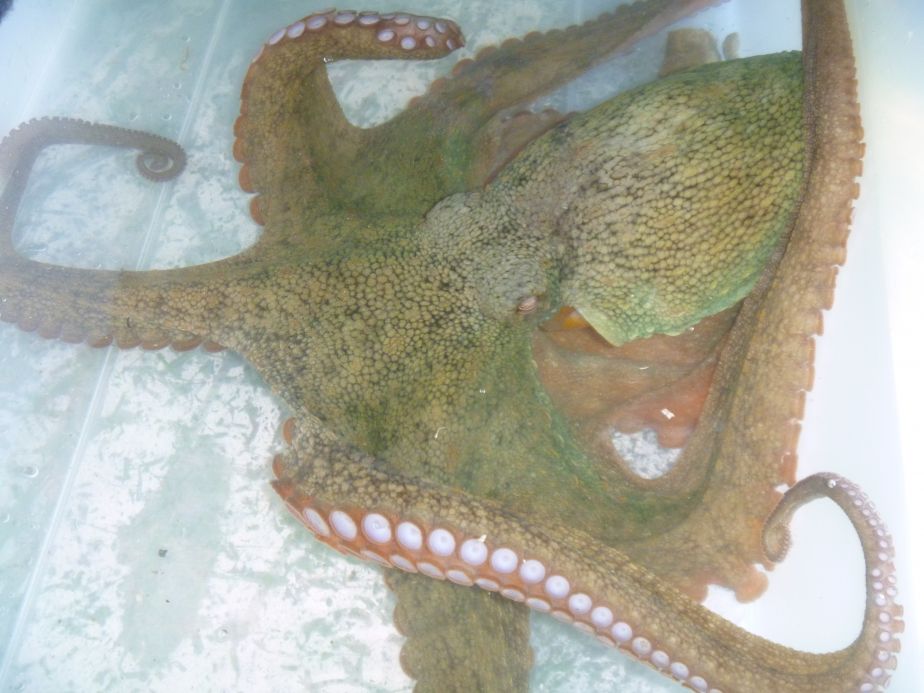Media Releases
‘Gloomy’ octopuses’ Tassie sea change

A James Cook University scientist says east coast octopuses are extending their range south, riding a new wave of warm water to Tasmania as ocean currents change.
JCU’s Associate Professor Jan Strugnell and colleagues from the University of Tasmania examined the genetic processes associated with the range shift. “Its real name is the common Sydney octopus or officially Octopus tetricus, but it’s known as the ‘gloomy’ octopus because, to human eyes, it looks like it has a rather downcast expression.”
Dr Strugnell said the octopus larvae likely drifted from their old east coast range south to Tasmania on the East Australian Current.
“As the seas have warmed, this has been transporting warmer waters than before into the temperate Tasmanian marine ecosystem and with it several dozen marine species that are new to the area.”
Dr Jorge Ramos, from the Institute for Marine & Antarctic Studies at the University of Tasmania, led the study. He said the octopus was first spotted in Tasmanian waters by local fishers and citizen scientists from the Redmap project.
“In recent years researchers have identified an increasing trend for both marine and terrestrial animals to shift their distributions, extending their ranges in response to climate change, as new areas become warm enough or other ecosystem changes take place,” said Dr Ramos
“As citizen science projects such as Redmap are revealing, range shifts are one of the most common responses of marine species to oceanic warming. So the gloomy octopus provided a good opportunity to examine what genetic process may allow marine range-shifting species to establish and persist in recently colonised areas due to oceanic warming,” he said.
The study found that octopus populations that are shifting suffered a ‘genetic bottleneck’, which is the loss of genetic diversity, and is likely to occur during range shifts.
“Surprisingly, even though genetic bottlenecks were detected, genetic diversity was moderate and comparable between populations from their usual home and the new place,” said Dr Strugnell.
She said one of the possible reasons is that the octopuses came from one location that is relatively similar to Tasmania in terms of temperature compared with the other sites.
The study was a collaboration between researchers from the University of Tasmania, James Cook University and the NSW Department of Primary Industries. It was recently published in the journal Scientific Reports.
Images and video here.
Please credit as marked.
Paper available here.
Explaining range shifts and genetic changes
Imagine that you are from a city where extremely cold weather is dominant throughout the year, and that you are moving to an island where cold weather is common most of the year but also has a wide range of weather conditions, including a very hot summer and a rainy season.
You bring with you two bags; one bag contains winter clothes, for instance thermals, beanies, gloves and all those clothes that will keep you warm during cold weather conditions. The second bag contains clothes for summer and for the rainy season.
However, the airline loses your second bag and suddenly you have only half of your clothes (genetic bottleneck)!
You are lucky that there is a regular inflow of products to the island, where you can find more winter clothes, as well as a wide range of sandals, bathers, shorts and sunglasses for the hot summer, and rain coats and water proof boots for the rainy season.
This wide diversity of clothes (high genetic diversity) and constant trade of products (persistent gene flow) will help you get over your lost clothes (loss of genetic diversity) and thrive in the extremely variable weather of the island, where you will now be capable of staying throughout the year.
Contacts: Associate Professor Jan Strugnell
E: jan.strugnell@jcu.edu.au
Andrew Rhodes – Institute for Marine & Antarctic Studies Communications Manager
P: (03) 6226 6683
E:ajrhodes@utas.edu.au